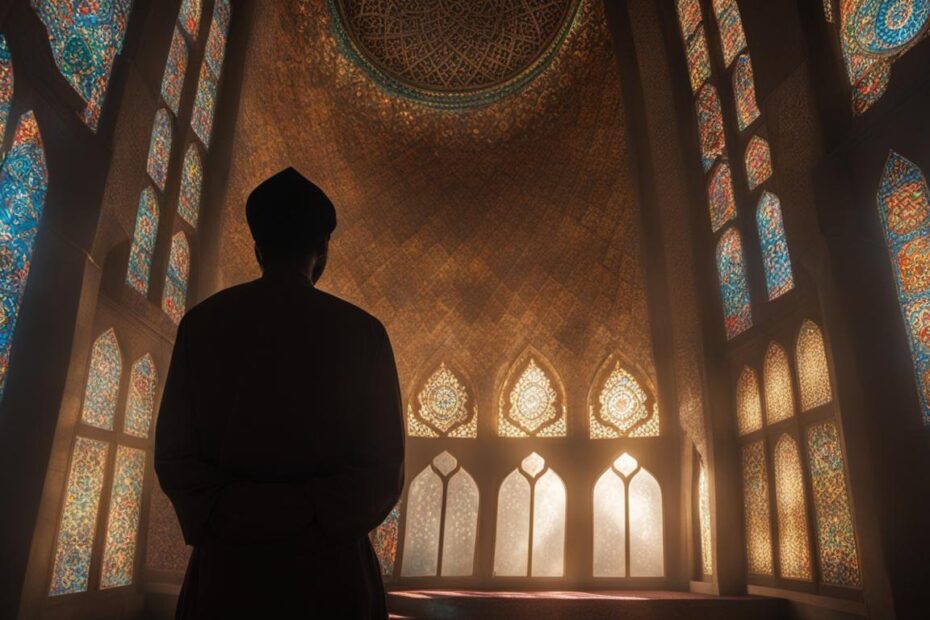In Islam, prayer, also known as salah or namaz, is a fundamental aspect of worship and spiritual practice. It is considered to be the second most important pillar of Islam. Muslims pray to Allah, their Deity, five times a day at specific times determined by the position of the sun. Prayer is a way for Muslims to show devotion, submit to Allah, and seek forgiveness and guidance. It plays a transformative role in the lives of Muslims, serving as a means to connect with Allah and seek spiritual fulfillment.
Key Takeaways:
- Prayer, or salah, is a fundamental aspect of Islam and the second most important pillar of the religion.
- Muslims pray to Allah five times a day at specific times determined by the position of the sun.
- Prayer is a way for Muslims to show devotion, submit to Allah, and seek forgiveness and guidance.
- Prayer plays a transformative role in the lives of Muslims, allowing them to connect with Allah and seek spiritual fulfillment.
- The procedure of prayer involves specific physical movements, recitations, and supplications.
The Meaning and Purpose of Prayer in Islam
Prayer holds deep significance in Islam. It is a means for Muslims to establish a relationship with Allah, seek His guidance, and express their gratitude and devotion. The purpose of prayer is to worship Allah, fulfill religious obligations, and attain spiritual purification. It serves as a reminder of the ultimate purpose of life – to submit to Allah and seek His pleasure. Through prayer, Muslims seek to attain nearness to Allah and draw closer to Him. It is considered a spiritual cornerstone in Islamic practices.
Prayer in Islam is not just a ritualistic act; it is a way of life that encompasses all aspects of a believer’s existence. It serves as a constant reminder of Allah’s presence, guiding Muslims to align their thoughts, words, and deeds with the teachings of Islam. The importance of prayer lies in its transformative nature, allowing individuals to purify their hearts, seek forgiveness for their shortcomings, and strive for spiritual growth. By engaging in prayer, Muslims demonstrate their faith, obedience, and reliance on Allah as the ultimate source of guidance and fulfillment.
The Spiritual Benefits of Prayer
Prayer offers numerous spiritual benefits to believers. It provides a sense of peace, solace, and tranquility, allowing Muslims to find refuge in the remembrance of Allah. Through prayer, Muslims cultivate mindfulness, humility, and gratitude, enhancing their connection with Allah and promoting a sense of inner peace and contentment. It serves as a constant reminder of the transient nature of the world and the importance of focusing on the eternal. Prayer also serves as a means of seeking forgiveness and purification, enabling believers to rid themselves of spiritual impurities and strive for spiritual growth and elevation.
The Purpose of Prayer
Prayer serves multiple purposes in the life of a Muslim. Firstly, it is a means of worshiping Allah and fulfilling one’s religious obligations. It is a physical and spiritual act of submission to the will of Allah, demonstrating devotion and obedience. Prayer also serves as a means of seeking guidance and assistance from Allah. Muslims turn to Allah in prayer to seek His help, guidance, and blessings in every aspect of their lives. Furthermore, prayer is a means of self-reflection and self-improvement. It provides a space for introspection and a reminder to evaluate one’s actions and intentions, fostering personal growth and moral development.
| Benefits of Prayer in Islam | Importance of Salah |
|---|---|
| Strengthening the bond with Allah | Establishing a connection with the divine |
| Seeking forgiveness and purification | Attaining spiritual growth and elevation |
| Cultivating mindfulness, humility, and gratitude | Promoting inner peace and contentment |
The Rituals and Stages of Prayer in Islam
In Islam, the ritual of prayer, known as salah or namaz, involves a series of physical movements, recitations, and supplications. Muslims are required to perform five daily prayers at specific times determined by the position of the sun. These prayers are Fajr (dawn), Dhuhr (noon), Asr (afternoon), Maghrib (sunset), and Isha (night). Each prayer consists of a specific number of raka’ahs (cycles) and requires Muslims to assume different postures, including standing, bowing, prostrating, and sitting. It is essential to follow the proper order and perform the actions correctly to ensure the prayer is valid.
During prayer, Muslims face the Ka’aba, the sacred mosque in Mecca, Saudi Arabia. This direction is known as the qibla. Facing the qibla symbolizes the unity of the Muslim ummah (community) and their collective devotion to Allah. The physical movements and recitations in prayer are prescribed in the Qur’an, the holy book of Islam, and the teachings of the Prophet Muhammad. Prayer serves as a means for Muslims to connect with Allah, seek forgiveness, and seek guidance in their daily lives.
To ensure the validity of prayer, Muslims must also be in a state of ritual purity, achieved through wudu (ablution) or ghusl (ritual bath). Wudu involves washing specific body parts, such as the hands, face, and feet, while ghusl is performed to purify the entire body. The state of ritual purity is necessary to approach Allah with a clean and focused mind. Muslims strive to perform their prayers with utmost concentration, sincerity, and humility, avoiding distractions and worldly thoughts. Prayer is an essential aspect of Islamic practice, and its rituals and stages hold great significance in the lives of Muslims.
The Etiquette and Conditions of Prayer in Islam
In Islam, the act of prayer is not only a physical action but also requires adherence to certain etiquette and conditions. These guidelines ensure that the prayer is performed in the proper manner and with the right intentions. Here are some of the key etiquette and conditions that Muslims must observe when engaging in prayer:
1. Ritual Purity:
Before performing prayer, Muslims must attain a state of ritual purity. This involves performing ablution (wudu) or, in certain circumstances, a full body wash (ghusl). Ritual purity is essential for the validity of the prayer and signifies the physical and spiritual cleanliness required when standing before Allah.
2. Facing the Qibla:
During prayer, Muslims are required to face the qibla, which is the direction of the Ka’aba in Mecca, Saudi Arabia. By facing this holy site, Muslims demonstrate their unity and submission to Allah, focusing their attention solely on Him.
3. Modesty and Dress:
It is important for Muslims to maintain modesty and dress appropriately when engaging in prayer. This includes covering the awrah, which refers to certain parts of the body that should be covered. Modesty in appearance is a reflection of the reverence and respect Muslims have for the act of prayer.
4. Concentration and Sincerity:
During prayer, Muslims are encouraged to maintain a state of concentration and sincerity. This means avoiding distractions and worldly thoughts, and fully immersing oneself in the act of worship. Muslims are reminded to direct their thoughts, intentions, and supplications solely towards Allah.
5. Supplication (Dua):
Prayer provides an opportunity for Muslims to make supplications, or dua, to Allah. This involves expressing one’s needs, desires, and prayers, seeking guidance, forgiveness, and blessings from the Almighty. Muslims are encouraged to make dua during prayer, as well as outside of prayer times, to deepen their connection with Allah.
By adhering to these etiquette and conditions, Muslims ensure that their prayers are performed with the utmost reverence and sincerity. Prayer is not just a physical action but a spiritual journey, enabling Muslims to draw closer to Allah and seek His mercy and guidance.

| Ritual Purity (Wudu or Ghusl) | Facing the Qibla | Modesty and Dress | Concentration and Sincerity | Supplication (Dua) |
|---|---|---|---|---|
| Attain a state of ritual purity through ablution or full body wash | Face the qibla, the direction of the Ka’aba in Mecca | Cover the awrah and dress modestly | Maintain concentration and sincerity, avoiding distractions | Make supplications (dua) to Allah, expressing needs and desires |
The Significance of Du’a (Supplication) in Prayer
Du’a, or supplication, holds great importance in the practice of prayer in Islam. It is a means for Muslims to communicate with Allah, seek His help, and express their needs and desires. Du’a can be made in any language and in any manner, as long as it is done with sincerity and humility.
During prayer, Muslims are encouraged to make du’a, asking Allah for guidance, forgiveness, and blessings. This is an opportunity for individuals to connect with Allah at a deeper level and seek His intervention in their lives. By humbly requesting Allah’s assistance, Muslims acknowledge their dependency on Him and recognize that He is the ultimate source of support and guidance.
“And when My servants ask you concerning Me, indeed I am near. I respond to the invocation of the supplicant when he calls upon Me.” [Quran 2:186]
In addition to making du’a during prayer, Muslims can also engage in du’a outside of the prescribed prayer times. This allows for continuous communication with Allah, fostering a strong and intimate relationship with Him. Muslims are encouraged to make du’a in times of need, as well as in times of gratitude and contentment, recognizing that every aspect of their lives is under the control and guidance of Allah.
Table: The Power of Du’a in Islamic Prayers
| Du’a | Meaning | Benefits |
|---|---|---|
| Seeking Forgiveness | Repentance and seeking Allah’s mercy | Forgiveness of sins, purification of the soul |
| Seeking Guidance | Asking Allah for direction and clarity | Divine guidance, making the right choices |
| Expressing Gratitude | Thanking Allah for His blessings | Increase in blessings, contentment of the heart |
| Seeking Healing | Requesting Allah’s cure and well-being | Physical and spiritual healing, comfort |
By incorporating du’a into their prayers, Muslims strive to strengthen their connection with Allah, seek His help and guidance, and find comfort and solace in times of difficulty. It is a powerful tool that allows Muslims to express their deepest emotions and desires, knowing that Allah hears and responds to the prayers of His sincere worshippers.
The Spiritual Effects and Benefits of Prayer in Islam

Prayer in Islam has numerous spiritual effects and benefits. Muslims understand the importance of prayer in connecting with Allah and seeking His guidance and blessings. Through regular prayer, Muslims develop a strong connection with Allah and experience a sense of tranquility, peace, and solace, especially during challenging times. This profound spiritual experience enables Muslims to find inner strength, resilience, and a sense of purpose in their lives.
One of the key benefits of prayer is its transformative power. Regular prayer strengthens faith, purifies the heart, and increases mindfulness of Allah in every aspect of life. It serves as a constant reminder to abstain from sinful behavior and strive for self-improvement. Prayer encourages Muslims to reflect on their actions, seek forgiveness for their shortcomings, and actively participate in acts of charity and kindness. It is believed that prayer brings spiritual rewards, forgiveness of sins, and protection from evil.
Moreover, prayer plays a significant role in fostering a sense of community and unity among Muslims. When Muslims come together in congregational prayers, they experience a deep sense of brotherhood and equality. Prayer breaks down social barriers, as Muslims from different backgrounds and walks of life stand shoulder to shoulder, united by their shared faith and devotion. This unity extends beyond the physical act of prayer and permeates other aspects of communal life, promoting cooperation, support, and compassion.
The Spiritual Effects and Benefits of Prayer:
- Connection with Allah: Prayer helps Muslims establish a strong connection with their Creator, seeking His guidance, and expressing their devotion and gratitude.
- Transformative Power: Regular prayer strengthens faith, purifies the heart, and increases mindfulness of Allah in every aspect of life.
- Spiritual Fulfillment: Prayer provides a sense of tranquility, peace, and solace, especially during challenging times, enabling Muslims to find inner strength and purpose.
- Self-Improvement: Prayer serves as a constant reminder to abstain from sinful behavior, seek forgiveness, and actively participate in acts of charity and kindness.
- Unity and Community: Prayer fosters a sense of brotherhood and equality among Muslims, breaking down social barriers and promoting cooperation and compassion.
In conclusion, prayer in Islam holds immense spiritual significance. It serves as a means for Muslims to connect with Allah, seek His guidance, and experience inner peace and fulfillment. Through prayer, Muslims strengthen their faith, purify their hearts, and strive for self-improvement. Prayer also fosters a sense of unity and community among Muslims, promoting cooperation and compassion. The spiritual effects and benefits of prayer extend beyond the ritualistic aspects, enriching the lives of Muslims and guiding them towards a more fulfilling and purposeful existence.
The Importance of Belief and Faith in Prayer
Belief and faith in Allah are the foundation of sincere prayer in Islam. Without a firm conviction in the existence of God and His attributes, prayer loses its essence and becomes merely a mechanical ritual. True prayer requires a deep and unwavering belief in Allah’s power, mercy, and omnipresence. It is through genuine faith that one can connect with the divine and experience the transformative power of prayer.
In Islam, belief in God goes beyond a mere intellectual acceptance; it encompasses a profound recognition of one’s complete dependence on Allah and a sincere submission to His will. The stages of a sincere prayer reflect this belief, starting with humility and reverence, followed by seeking forgiveness and guidance, and ending with complete trust in Allah’s wisdom and mercy.
Prayer is not just an outward act; it is an expression of faith in action. It is a manifestation of the believer’s trust in Allah’s ability to answer prayers and provide guidance. Belief in God’s presence and His involvement in every aspect of life is what fuels the sincerity and fervor in prayer. Without belief and faith in Allah, prayer loses its transformative power and becomes an empty ritual devoid of spiritual meaning.
Stages of a Sincere Prayer
| Stage | Description |
|---|---|
| Humility and Reverence | Recognizing one’s insignificance and the greatness of Allah, expressing humility, and approaching prayer with reverence. |
| Seeking Forgiveness | Reflecting on one’s shortcomings and seeking forgiveness from Allah, acknowledging the need for His mercy and guidance. |
| Supplication | Presenting one’s personal needs and desires to Allah, seeking His help, guidance, and blessings. |
| Trusting in Allah’s Decision | Accepting that Allah’s wisdom surpasses human understanding and placing complete trust in His decisions, even if they differ from one’s own desires. |
Belief in God and unwavering faith are essential prerequisites for sincere prayer in Islam. They form the bedrock upon which the transformative power of prayer is built. Through belief and faith, a person can experience a deep connection with Allah, find solace and guidance in prayer, and witness the profound impact of submitting to the will of the Most High.
The Concept of Invoking God and Having Hope in Prayer
Invoking God and having hope in Him are integral aspects of prayer in Islam. When a person calls upon Allah and places their hope solely in Him, they acknowledge His ultimate power and control over all matters. In this state, one recognizes that all circumstances are orchestrated by Allah and everything happens according to His divine plan. True prayer involves trusting and hoping in Allah alone, rather than relying on worldly means and individuals. It is a way to surrender to His guidance and seek His mercy.

In Islam, prayer is not merely a mechanical ritual, but an act of complete submission and reliance on Allah. Muslims believe that all blessings and guidance come from Him alone. By invoking God and having hope in Him, Muslims affirm their belief in His power and seek His intervention in their lives. Prayer becomes a means to strengthen their faith and find solace in times of difficulty or uncertainty.
“And when My servants ask you concerning Me, indeed I am near. I respond to the invocation of the supplicant when he calls upon Me. So let them respond to Me [by obedience] and believe in Me that they may be [rightly] guided.” (Quran 2:186)
The Importance of Hope in Prayer
Having hope in prayer is not only a fundamental aspect of Islamic faith but also a source of comfort and optimism in times of hardship. It allows Muslims to maintain a positive outlook and trust in Allah’s mercy and wisdom. When faced with challenges, Muslims turn to prayer as a means to seek divine assistance and find strength in their relationship with Allah.
In the Quran, Allah promises to answer the prayers of those who call upon Him sincerely and with hope. The act of invoking God and having hope in prayer reflects the belief that Allah is the ultimate provider and source of all blessings. It encourages Muslims to place their trust in Him and rely on His guidance and mercy.
The Power of Invoking God
Invoking God in prayer is a powerful spiritual practice that connects Muslims with their Creator. It allows them to express their needs, desires, and gratitude to Allah. By calling upon Him and having hope in His mercy, Muslims establish a profound bond with the Divine. This connection provides comfort, guidance, and reassurance in both good times and bad.
Invoking God is not limited to specific times or specific words. Muslims are encouraged to turn to Allah at all times and in all circumstances. They believe that He is the All-Hearing, All-Knowing, and All-Merciful, ready to respond to their prayers and grant them what is best for them.
In Conclusion
Invoking God and having hope in prayer are essential components of the Islamic faith. Muslims recognize that their ultimate reliance should be on Allah alone and that He has the power to answer their prayers. By placing their trust in Him, Muslims find strength, comfort, and guidance in their relationship with Allah. Prayer becomes a means to establish a deep connection with the Divine and seek His mercy and blessings.
The Role of Du‘a in Strengthening the Bond with Allah
Du‘a, or supplication, plays a crucial role in strengthening the bond between the supplicant and Allah in prayer. When a person sincerely supplicates to Allah, they establish a connection and intimacy with their Creator. Du‘a is a means to seek closeness to Allah, express one’s needs and desires, and develop a deeper understanding of His divine attributes. Through du‘a, a person can experience the love, fear, and knowledge of Allah, seeking His forgiveness, guidance, and blessings. It is a spiritual conversation that deepens the supplicant’s knowledge and awareness of Allah’s presence.
Communication with God is a fundamental aspect of prayer in Islam. Through du‘a, Muslims can establish a direct line of communication with Allah, seeking His guidance, support, and mercy. Du‘a allows individuals to express their deepest concerns, hopes, and desires to their Creator. It is a way to seek assistance and guidance in various aspects of life, including personal difficulties, challenges, and decisions. Through du‘a, Muslims acknowledge their dependence on Allah and recognize His ultimate power and ability to respond to their prayers.
“O you who have believed, seek help through patience and prayer. Indeed, Allah is with the patient.” – Quran 2:153
Du‘a also serves as a means of spiritual connection and self-reflection. It allows individuals to introspect and assess their own thoughts, actions, and intentions. By humbly turning to Allah and seeking His forgiveness and guidance, Muslims are reminded of their own shortcomings and the need to strive for self-improvement. Through du‘a, individuals can find solace, peace, and comfort, knowing that they have placed their concerns and worries in the hands of Allah, the Most Merciful.
Table: Benefits of Du‘a in Strengthening the Bond with Allah
| Benefits | Description |
|---|---|
| Strengthening the Bond | Du‘a allows individuals to establish a deep connection with Allah, fostering love, knowledge, and fear of Him. |
| Seeking Guidance | Through du‘a, Muslims can seek Allah’s guidance and clarity in making decisions and facing challenges. |
| Self-Reflection | Du‘a encourages individuals to reflect on their own actions, thoughts, and intentions, fostering self-awareness and self-improvement. |
| Comfort and Solace | By turning to Allah in du‘a, individuals find peace, solace, and comfort, knowing that they have placed their concerns in His hands. |
| Dependence on Allah | Du‘a serves as a reminder of individuals’ dependence on Allah for all their needs and the recognition of His ultimate power and mercy. |
Overall, du‘a is a powerful means of strengthening the bond between the supplicant and Allah in prayer. It serves as a spiritual conversation, allowing individuals to seek closeness to Allah, express their needs and desires, and deepen their understanding and awareness of His presence. Through du‘a, Muslims can establish a direct line of communication with their Creator, seeking His guidance, support, and mercy. Du‘a is an integral aspect of prayer in Islam, serving as a means of connection, self-reflection, and spiritual fulfillment.

The Gem and Spirit of Worship – Exploring Du‘a
Du‘a, or supplication, is considered the gem and spirit of all worship in Islam. It is a form of communication with Allah, where believers express their needs, hopes, and desires. Du‘a is a comprehensive act of worship that encompasses love, fear, knowledge, repentance, and submission. When performing du‘a, Muslims experience a deep connection with their Creator, seeking closeness and understanding of Allah’s divine attributes. It is a powerful form of worship that brings about transformative spiritual experiences.
The qualities of du‘a are vast and encompass a wide range of emotions and desires. Whether it is seeking forgiveness, guidance, or blessings, du‘a symbolizes an individual’s complete reliance on Allah and recognition of His ultimate power and control. Through du‘a, Muslims find solace and serenity, as well as a means to express gratitude and seek forgiveness for their shortcomings. It is a spiritual conversation that deepens their knowledge and awareness of Allah’s presence.
| Du‘a Qualities | Description |
|---|---|
| Sincerity | Supplicating with utmost sincerity and devotion. |
| Humility | Approaching Allah with humility, recognizing His greatness. |
| Persistence | Continuously seeking Allah’s help and guidance. |
| Contentment | Accepting Allah’s will and being content with His decree. |
| Patience | Exercising patience and trust in Allah’s timing and plan. |
| Gratitude | Expressing gratitude to Allah for His blessings and favors. |
Through the act of du‘a, believers find spiritual fulfillment, peace, and purpose in life. The gem and spirit of worship lie within the profound connection and communication between the supplicant and Allah. It is through du‘a that Muslims experience the essence of their faith, seeking Allah’s pleasure and guidance in every aspect of their lives.

Discovering the Spiritual Meaning of Du‘a
Prayer in Islam encompasses a profound spiritual meaning that goes beyond seeking material and temporary necessities. It serves as a means for individuals to find purpose and fulfillment in life. Through prayer and du‘a, Muslims are able to transcend the transient nature of the world and connect with the eternal and divine aspect of existence. It is in the act of supplicating to Allah that one can experience spiritual peace, find solace and serenity, and establish a profound relationship with the Creator.
| Key Points | Spiritual Meaning of Du‘a |
|---|---|
| Du‘a goes beyond material needs | It helps individuals find purpose and fulfillment in life by connecting with the divine aspect of existence. |
| Transcending the transient nature of the world | Prayer allows individuals to find spiritual peace, solace, and serenity in the presence of Allah. |
| Establishing a profound relationship with Allah | Through du‘a, individuals can develop a deep and intimate connection with the Creator, seeking His guidance and blessings. |
“The spiritual meaning of du‘a lies in the ability to recognize that our purpose in life is greater than the pursuit of worldly desires. It is through prayer that we establish a connection with the divine and find true fulfillment.”
Prayer serves as a reminder of the significance of worship and the ultimate goal of seeking Allah’s pleasure. It is a profound act of submission and surrender to the will of Allah, allowing individuals to experience a sense of transcendence and purpose. The spiritual meaning of du‘a lies in the ability to recognize that our purpose in life is greater than the pursuit of worldly desires. It is through prayer that we establish a connection with the divine and find true fulfillment.
The transformative power of du‘a
Du‘a has the power to transform individuals from within, bringing about personal growth, self-reflection, and a deepening of faith. It allows individuals to reflect on their actions, seek forgiveness for their shortcomings, and strive for self-improvement. Through du‘a, Muslims are able to tap into their innermost desires and aspirations, seeking guidance and support from Allah. The spiritual purpose of prayer is to align one’s heart and intentions with the divine will, allowing for a transformative journey of self-discovery and spiritual growth.
Prayer as a Means for Transformation and Self-Improvement
Prayer in Islam goes beyond being a mere act of worship; it is a catalyst for personal transformation and self-improvement. Through the practice of prayer, Muslims develop self-discipline, cultivate moral virtues, and hold themselves accountable for their actions. The act of prayer serves as a daily reminder to abstain from sinful behaviors, purify the soul, and seek forgiveness for past transgressions. It provides an opportunity for introspection and self-reflection, allowing individuals to identify their weaknesses and strive for self-improvement.
By establishing a regular prayer routine, Muslims learn to discipline themselves and prioritize their spiritual well-being. Prayer requires one’s full attention and concentration, fostering mindfulness and focus. Through this practice, believers develop the ability to resist temptations, exercise self-control, and make choices that align with their moral and ethical values. The act of prayer becomes a means of strengthening one’s character and cultivating positive traits such as patience, gratitude, and humility.
In addition to personal growth, prayer also plays a significant role in fostering a sense of community and social responsibility. Muslims are encouraged to pray in congregation whenever possible, creating an environment of unity and solidarity. This collective act of worship reinforces the values of compassion, empathy, and support for one another. Prayer serves as a reminder that individuals are part of a larger community and have a shared responsibility to uplift and assist one another in times of need.
In conclusion, prayer in Islam serves as a transformative practice that goes beyond its ritualistic aspects. It empowers individuals to develop self-discipline, cultivate moral virtues, and strive for self-improvement. By prioritizing spiritual growth and holding oneself accountable, Muslims are able to become better versions of themselves. This journey of personal transformation not only benefits the individual but also extends to the wider community, fostering unity and social responsibility.
The Universal Message of Prayer in Islam
Prayer in Islam carries a universal message of unity and shared belief among Muslims. No matter where a Muslim is in the world, they perform the same prayers, using the same movements and recitations, at the same relative times of day. This practice fosters a sense of unity, community, and brotherhood among Muslims, transcending geographical boundaries and cultural differences. It serves as a reminder of the shared faith and beliefs that bind Muslims together as an ummah (community). The significance of prayer extends globally, creating a sense of connection and belonging among Muslims worldwide.
Prayer in Islam is a powerful unifying force that brings Muslims together, regardless of their backgrounds and nationalities. It serves as a reminder that all Muslims are equal in the eyes of Allah and that their worship is guided by the same principles and rituals. Through prayer, Muslims express their devotion and surrender to Allah, reinforcing their sense of belonging to the global Muslim community. They find solace in the knowledge that they are connected to millions of fellow worshippers around the world, all engaged in the same act of devotion at the same time.
This sense of unity and connection extends beyond the physical act of prayer. Muslims who have the opportunity to perform the Hajj pilgrimage in Mecca experience a profound sense of unity as they join millions of other Muslims from different countries and cultures in performing the same rituals and prayers. The experience of standing shoulder to shoulder with fellow believers, all facing the Ka’aba, reinforces the universal message of prayer in Islam and solidifies the bonds of brotherhood and sisterhood among Muslims.
The Global Significance of Salah
The global significance of salah, or prayer, in Islam cannot be overstated. It serves as a constant reminder of the universality of the Islamic faith and the common thread that binds Muslims across the world. The act of prayer is not only a personal and individual endeavor; it is an integral part of a collective and global Muslim identity. Through prayer, Muslims demonstrate their unity, reverence, and deep connection with Allah and with one another. It is a powerful symbol of the strength and resilience of the global Muslim community.
As Muslims bow and prostrate in prayer, they are reminded of their humility and the need to submit to a higher power. This shared act of submission to Allah reinforces the bonds of unity among Muslims, transcending language, culture, and geographic boundaries. It is a powerful reminder that, despite our differences, we are all part of a greater whole, bound together by our faith and devotion to Allah.
| Table 13.1: The Global Significance of Salah | |
|---|---|
| Unity | Prayer unites Muslims from diverse backgrounds and cultures, fostering a sense of unity within the global Muslim community. |
| Identity | Prayer is an integral part of the Muslim identity, serving as a constant reminder of one’s connection with Allah and the global Muslim ummah. |
| Humility | Prayer humbles Muslims, reminding them of their dependence on Allah and the need to submit to His will. |
In conclusion, prayer in Islam carries a universal message of unity, connection, and shared belief among Muslims across the globe. It serves as a unifying force, bringing Muslims together and fostering a sense of community and brotherhood. Prayer transcends geographical boundaries and cultural differences, reminding Muslims of their shared faith and beliefs. Whether performed in the privacy of one’s home or in the congregation, prayer is a powerful act of devotion that reinforces the bond between the individual and Allah, as well as the bond between Muslims worldwide.
The Transformative Power of Prayer in Everyday Life
Prayer in Islam is not confined to the ritualistic aspects performed at specific times of the day. Rather, it has a transformative power that extends to everyday life. Muslims are encouraged to maintain a state of mindfulness and remembrance of Allah throughout their daily activities. Prayer serves as a constant reminder of Allah’s presence and the importance of living a righteous and virtuous life. It influences the decisions, actions, and behavior of Muslims, guiding them to make choices that align with their faith and values. Salah has a profound impact on all aspects of a Muslim’s life, helping them navigate challenges, make ethical choices, and seek spiritual fulfillment.
When performing their daily prayers, Muslims engage in physical movements, recitations, and supplications. These actions instill discipline, focus, and a sense of purpose in their lives. Prayer acts as a spiritual anchor, grounding Muslims and providing them with a sense of stability and direction. It allows them to seek guidance and seek refuge in Allah during times of uncertainty and difficulty.
Moreover, prayer in everyday life promotes self-reflection and self-improvement. It serves as a time for introspection, allowing Muslims to evaluate their actions and seek forgiveness for any wrongdoings. Prayer offers a chance for spiritual renewal and purification of the heart. Through prayer, Muslims strive to cultivate moral virtues, such as patience, gratitude, humility, and compassion, which they can then carry into their interactions with others and their daily endeavors. It is through the practice of prayer that Muslims develop a heightened sense of self-awareness and a deep connection with Allah.
Table: The Impact of Salah in Everyday Life
| Aspect of Life | Impact of Salah |
|---|---|
| Personal Discipline | Prayer instills discipline, helping individuals develop a consistent and structured daily routine. |
| Mental Well-being | Prayer provides a sense of calm and tranquility, reducing stress and promoting mental well-being. |
| Moral Values | Prayer promotes moral virtues such as integrity, compassion, and humility. |
| Self-reflection | Prayer encourages self-reflection, allowing individuals to evaluate their actions and seek forgiveness. |
| Connection with Allah | Prayer strengthens the bond with Allah, fostering a deep sense of spirituality and reliance on Him. |
Prayer in everyday life is not just a series of rituals, but a transformative practice that permeates every aspect of a Muslim’s life. It reinforces the importance of aligning one’s intentions and actions with their faith and values. By maintaining a constant awareness of Allah, Muslims are able to navigate challenges, make ethical choices, and seek spiritual fulfillment. Prayer provides a sense of purpose and guidance, empowering individuals to lead a meaningful and virtuous life in both their personal and social spheres.
Conclusion
Prayer in Islam holds immense significance and plays a transformative role in the lives of Muslims. It is a means to establish a connection with Allah, seek His guidance, and express devotion and gratitude. Prayer is a daily practice that helps Muslims fulfill their religious obligations, purify their hearts, and seek spiritual fulfillment.
Prayer serves as a reminder of the purpose of life, to worship Allah alone and seek His pleasure. It not only fosters a strong bond with Allah, but also promotes self-discipline, moral virtues, and unity among Muslims. The power of prayer extends beyond the ritualistic aspects, influencing the daily lives and decisions of Muslims.
With its universal message of unity and shared beliefs, prayer in Islam transcends geographical boundaries and cultural differences. It creates a sense of connection and belonging among Muslims worldwide, fostering a strong sense of community and brotherhood. The significance of prayer extends far beyond its physical aspects, permeating every aspect of a Muslim’s life and guiding them to live a righteous and virtuous life.
FAQ
What is the significance of prayer in Islam?
Prayer is considered a fundamental aspect of worship and spiritual practice in Islam. It serves as a means for Muslims to connect with Allah, seek His guidance, and express devotion and gratitude.
How many times a day do Muslims pray?
Muslims pray five times a day: Fajr (dawn), Dhuhr (noon), Asr (afternoon), Maghrib (sunset), and Isha (night).
What are the rituals involved in Islamic prayer?
Islamic prayer involves a series of physical movements, recitations, and supplications. It includes standing, bowing, prostrating, and sitting postures.
What are the etiquette and conditions for prayer in Islam?
Muslims are required to be in a state of ritual purity, face the direction of the Ka’aba, and dress modestly. They should also perform prayer with full concentration and sincerity.
What is the significance of du‘a (supplication) in prayer?
Du‘a allows Muslims to communicate with Allah, seek His help, and express their needs and desires. It is a means to seek closeness to Allah and develop a deeper understanding of His divine attributes.
What are the spiritual effects and benefits of prayer in Islam?
Prayer helps Muslims develop a strong connection with Allah, seek His guidance, and attain spiritual purification. It fosters self-discipline, moral virtues, and a sense of community among Muslims.
What role does belief and faith play in prayer?
Belief in Allah and His attributes is essential for the efficacy of prayer. Faith involves recognizing one’s complete dependence on Allah and submitting to His will.
What is the concept of invoking God and having hope in prayer?
Invoking God and placing hope solely in Him reflects acknowledgement of His ultimate power and control over all matters. It involves trusting and hoping in Allah alone.
How does du‘a strengthen the bond with Allah?
Du‘a establishes a connection and intimacy with Allah. It allows individuals to seek closeness to Him, express their needs and desires, and develop a deeper understanding of His divine attributes.
What is the significance of du‘a in worship?
Du‘a is considered the gem and spirit of all worship in Islam. It carries divine blessings, relief, and numerous merciful advantages. It encompasses various aspects of worship, including love, fear, knowledge, repentance, and submission.
What is the spiritual meaning of du‘a?
Du‘a allows individuals to transcend the transient nature of the world and connect with the eternal and divine aspect of existence. It brings spiritual peace, solace, and a profound relationship with Allah.
How does prayer contribute to personal transformation and self-improvement?
Regular prayer cultivates self-discipline, moral virtues, and a sense of accountability. It encourages self-reflection, self-improvement, and living a righteous and virtuous life.
What is the universal message of prayer in Islam?
Prayer in Islam fosters unity, community, and brotherhood among Muslims. It transcends geographical boundaries and cultural differences, reminding Muslims of their shared faith and beliefs.
How does prayer have a transformative power in everyday life?
Prayer in Islam influences the daily lives and decisions of Muslims. It reminds them of Allah’s presence, guides their choices, and helps them navigate challenges while seeking spiritual fulfillment.









